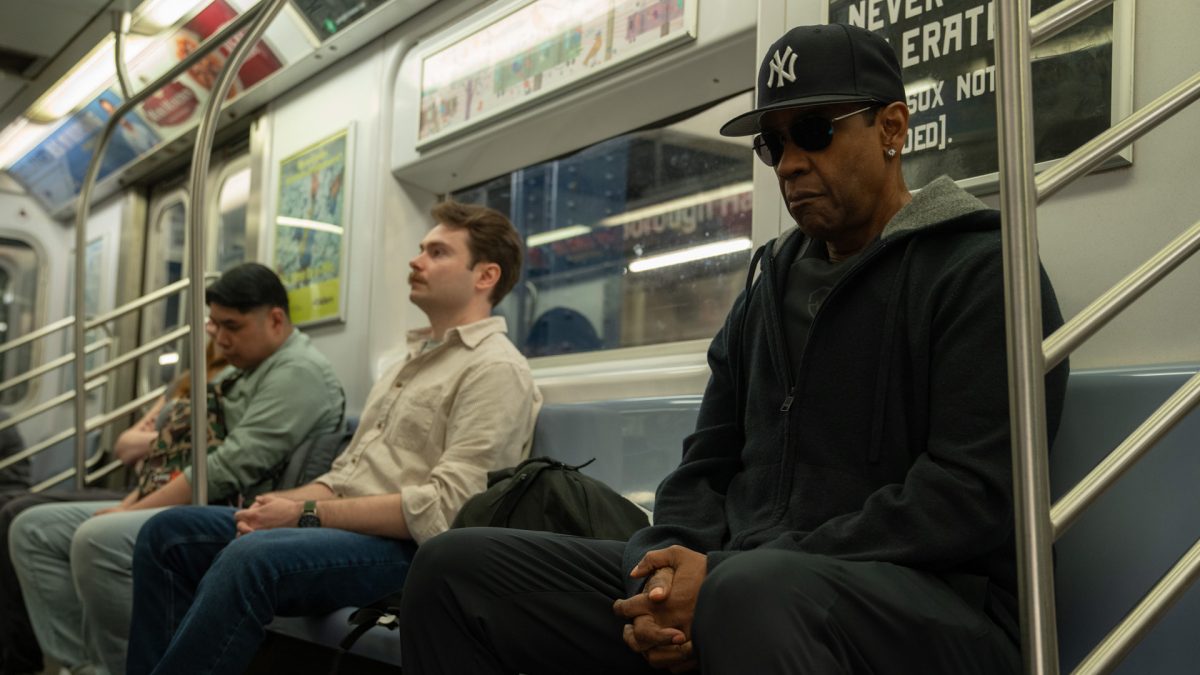Spike Lee’s “Highest 2 Lowest” tries to be many things at once — a biting crime thriller, a heartwarming family tale and an examination of Black success. It succeeds only in the latter.
The film, a remake of the Akira Kurosawa classic “High and Low,” follows music mogul David King (Denzel Washington) as he becomes embroiled in a ransom plot. King’s son is thought to be the abductee, but it’s soon revealed that the kidnapper, a rapper named Yung Felon (A$AP Rocky), took another boy by mistake — his son’s best friend.
The first half of this film is almost impossible to sit through, packed with hammy dialogue and utterly void of an emotional core. King is preparing to buy back the majority stock of his record label, and the film presents this move as at odds with his role as a family man. Tension comes to a head when King is asked to pay the $17.5 million ransom for another man’s son, an act of humanity that would cost him his label.
Thanks to Rocky’s novice acting, the scene of the ransom call feels less like a hostage negotiation and more like a meager spat between King and his emo nephew. What should be a powerful scene ultimately falls flat, due in part to Lee’s reliance on dialogue for emotional moments instead of the visuals that made Kurosawa’s film great. In the original, when the father of the kidnapped boy begs King’s counterpart to pay the ransom, the camera tracks backward as everyone in the room averts their gaze, creating a beautiful shot that perfectly encapsulates piercing guilt.
Compare this to the 2025 film and the difference is clear. Upon being asked privately to pay — with some particularly stilted acting — King merely retreats to his study. Even once he is alone, the film relies on dialogue to tell us how he feels, as he speaks in half-hearted distress to portraits of Black musicians on the wall. “What would you do, Stevie? Jimi? Aretha?” he laments. Ironically, this entire scene is overlayed with comically nondescript soap opera-style piano music, transforming it into a caricature of the intended heavy emotional beat.
The film’s entire soundtrack sounds like it was bought on a stock website, a forgivable offense were it not blaring in every scene. You’re better off watching the film on mute if you want that imaginative Lee imagery we’ve all come to expect. But if the soundtrack is a papercut of Lee’s vision, the editing is a knife in its back. Cuts are clumsy and abrupt, like one where a shot of the kidnapped boy’s father (Jeffrey Wright) praying is inexplicably interrupted by a shot of his son, killing the scene’s dramatic impact, all before returning to the prayer.
While the second half of the film never quite escapes the hole dug by the first, it feels more like the stylized New York City crime thriller we were promised. It develops an interesting dynamic between King and Yung Felon, particularly in two scenes which recreate the iconic confrontation from the Kurosawa film. In the first, Lee trades prison glass for that of a recording studio and the two confront each other in, yes, a rap battle. In the second, a music video of sorts makes use of exciting visuals like a line of guns bisecting the screen, a separation that reflects the two men’s differing views on violence. While these scenes fall victim to the same sub-par execution as the rest of the film, they reveal a glimmer of what “Highest 2 Lowest” could have been.
Unlike “High and Low,” this film’s commentary on class is incidental, focusing instead on the nature of Black success and the responsibility of those who achieve it. King and Yung Felon come from a similar background, but they lead opposite lives. King made his fortune elevating Black musicians with his label and he uses that power to support his family and community. Yung Felon pursues that same success through violence, specifically against the most privileged member of his community — King. He covets what King has attained and grows embittered, forging a path of adversity and isolation for himself.
While Lee’s seeming self-exploration here ignores larger systemic issues, it presents a thoughtful position on Black success. This saves an otherwise mediocre film from fading into a slew of “Parasite” copycats. But that aside, “Highest 2 Lowest” is an unengaging watch and disheartening attempt at reimaging a classic.
Contact Sarah Kluckhohn at [email protected].
























































































































































